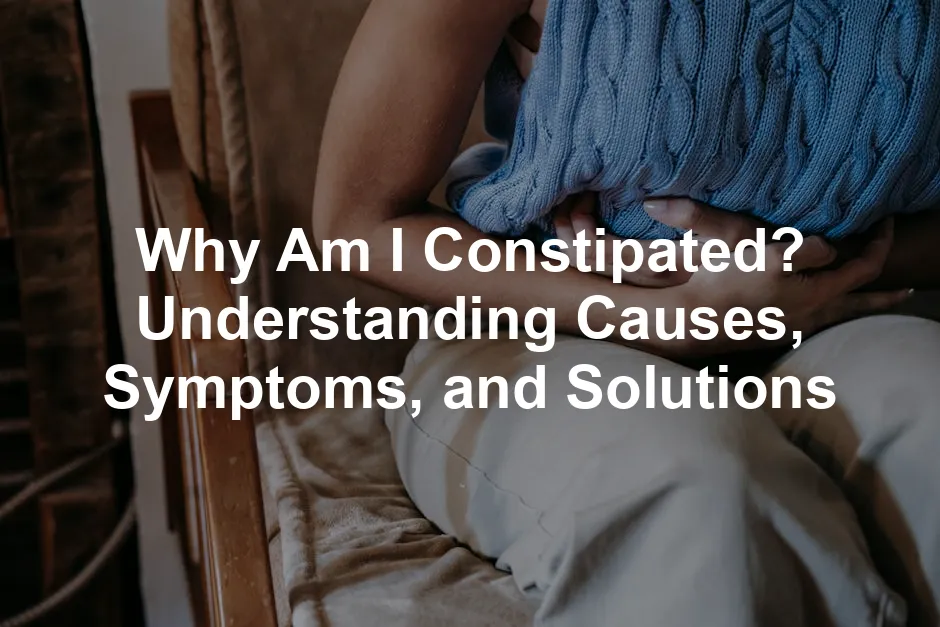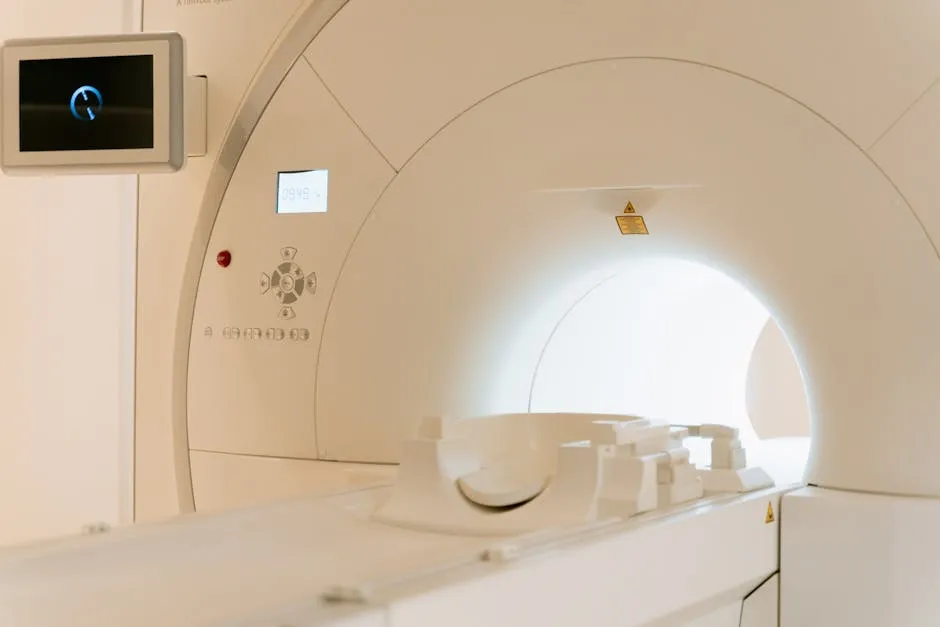
Why Am I Constipated? Understanding Causes, Symptoms, and Solutions
Introduction
Constipation is a common issue, affecting millions. It can cause discomfort and frustration. Understanding why it happens is vital for finding effective solutions. With the right knowledge, you can tackle constipation head-on and improve your digestive health.
Speaking of solutions, have you considered a fiber supplement? Products like Metamucil can help increase your daily fiber intake, making your digestive system happier than a kid in a candy store!

Summary and Overview
Constipation is defined as having fewer than three bowel movements weekly. Symptoms include hard, dry stools and straining during bowel movements. Various factors can lead to constipation. Lifestyle choices, such as low fiber intake and dehydration, play a significant role. Certain medications, like opioids and antacids, may also contribute. Additionally, medical conditions, including hypothyroidism and irritable bowel syndrome (IBS), are common culprits. If constipation persists or worsens, seeking medical advice is crucial. Untreated constipation can lead to complications like hemorrhoids or fecal impaction.
Also, don’t forget to hydrate! A stylish water bottle like the Hydracy Water Bottle can remind you to sip more throughout the day. Trust me, your body will thank you!

Understanding Constipation
Constipation occurs when bowel movements become infrequent, typically defined as fewer than three times a week. Everyone’s normal bowel movement frequency varies. Some may go daily, while others may only go a few times a week. The colon absorbs too much water from the stool during constipation, resulting in hard, dry feces. This process can be influenced by various factors. Common misconceptions include the belief that any change in bowel habits is concerning. In reality, occasional changes can be normal. Understanding your body’s patterns is essential for managing digestive health.
To help keep things moving, consider adding a probiotic capsule like Garden of Life Dr. Formulated Probiotics to your routine. These little wonders can help balance your gut flora and make sure your digestive system is the life of the party!

Causes of Constipation
Understanding the causes of constipation can help you take steps toward relief. Several factors contribute to this common issue. Let’s break them down.
Lifestyle Factors
The way we live greatly impacts our digestive health. Here are some key lifestyle factors that can lead to constipation:
- Low fiber intake: A diet lacking in fiber can slow down bowel movements. Fiber-rich foods like fruits, vegetables, and whole grains are essential for healthy digestion.
- Inadequate hydration: Not drinking enough water can harden stools, making them difficult to pass. Aim for at least eight glasses of water daily to keep things moving.
- Sedentary lifestyle: Lack of physical activity can weaken bowel function. Regular exercise stimulates muscles in the intestines, promoting regular bowel movements.
- Ignoring the urge to go: When you ignore the natural urge to use the bathroom, it can lead to stool hardening. Responding promptly to your body’s signals is crucial.
And while we’re on the topic of fiber, if you’re looking for a fantastic recipe collection, check out The High Fiber Diet Cookbook. It’s full of delicious and nutritious recipes that will have your taste buds dancing while your digestive system thanks you!

Medications
Certain medications may contribute to constipation. Here are some common culprits:
- Opioids: These powerful pain relievers can cause significant constipation by slowing down gut motility.
- Antacids: Some antacids, especially those containing aluminum or calcium, may lead to constipation as a side effect.
- Antidepressants: Many individuals taking these medications report constipation as a side effect.
Always consult your healthcare provider if you suspect your medications are causing constipation. They can provide alternative options or solutions.
Medical Conditions
Various medical conditions can also lead to constipation. Here are some conditions often associated with this issue:
- Irritable Bowel Syndrome (IBS): This common disorder can cause irregular bowel habits, including constipation.
- Diabetes: High blood sugar levels can affect nerve function in the digestive tract, leading to constipation.
- Hypothyroidism: An underactive thyroid can slow down metabolism, causing constipation.
Psychological factors like anxiety and depression can further exacerbate digestive issues. Stress can disrupt normal gut function, leading to constipation.
Key Points
Constipation affects millions worldwide. Statistics show roughly 20% of adults experience constipation at some point. Understanding dietary habits, medication side effects, and underlying medical conditions can help address this uncomfortable issue effectively. Always be aware of your body’s needs and seek help if you experience persistent constipation.

When to Seek Medical Advice
Constipation can be uncomfortable, but certain symptoms signal the need for immediate medical attention. If you notice blood in your stool, don’t hesitate to reach out to your healthcare provider. This can indicate a more serious issue that requires prompt evaluation.
Unexplained weight loss is another red flag. If this occurs alongside constipation, it’s crucial to seek help. Such changes may point to underlying health conditions that need addressing.
Additionally, if constipation persists for more than three weeks, a medical evaluation is essential. Chronic constipation can lead to complications, and understanding the cause is key to effective treatment.
Key Points
The Bristol Stool Chart is a helpful tool for assessing stool consistency. It categorizes stools from type 1 (hard lumps) to type 7 (liquid). Understanding your stool type can provide insights into your bowel health and digestive discomfort.

Diagnosis and Tests
Initial Consultation
When you visit a healthcare provider for constipation, expect them to ask specific questions. They’ll want to know about your bowel habits, including frequency and consistency. Sharing your medical history is essential, as past conditions can provide context. Be sure to mention any medications you’re taking, as some can contribute to constipation.
Physical Examination and Tests
During a physical exam, your doctor may check your abdomen for tenderness or blockages. They may also perform a rectal exam to assess muscle tone and detect abnormalities. Depending on your symptoms, additional tests may be recommended.
Blood tests can help identify conditions like hypothyroidism or anemia. Imaging tests, such as X-rays or colonoscopies, may be necessary to visualize the colon. These diagnostic procedures are vital for ruling out serious underlying conditions.
Key Points
Receiving a thorough evaluation is crucial for those with chronic constipation. Understanding the reasons behind your symptoms will guide effective management. Proper diagnosis can lead to appropriate treatments for your gastrointestinal health.

Management and Treatment
Self-Care Strategies
Managing constipation often starts at home. Simple lifestyle changes can make a big difference.
Dietary changes are key. Aim to increase your fiber intake. Foods rich in dietary fiber include fruits, vegetables, legumes, and whole grains. Fiber helps bulk up stools, making them easier to pass. Staying hydrated is equally important. Drink plenty of water throughout the day. Aim for at least eight glasses. This helps soften your stool and keeps your digestive system functioning well. You might also consider adding probiotics to your diet. Foods like yogurt and kefir can promote gut health.

If you’re looking for a quick and easy breakfast, consider instant oatmeal like Quaker Instant Oatmeal. It’s a fiber-rich option that can help kickstart your day and keep your digestive system happy!
Over-the-Counter Options
If self-care strategies don’t work, over-the-counter laxatives can help. There are several types available:
- Bulk-forming laxatives: These increase stool bulk and are often made from fiber.
- Stool softeners: These help mix fluid into stools.
- Stimulant laxatives: These stimulate bowel contractions.
Speaking of stool softeners, you might want to try Dulcolax Tablets. They are quite effective for those times when you need a little extra help!
Prescription Medications
For severe cases of constipation, prescription medications may be necessary. Drugs like lubiprostone and linaclotide are commonly prescribed. These medications help increase fluid in the intestines, making it easier to pass stools. Always discuss potential side effects with your doctor before starting any new medication.
Surgical Options
In rare cases, surgical interventions may be required. This usually happens when structural issues in the colon are present, such as blockages or severe rectal problems. Surgery is typically seen as a last resort when other treatments fail.
Key Points
Managing mild to moderate constipation involves a combination of dietary changes, increased hydration, and regular exercise. Over-the-counter laxatives can provide relief, but use them wisely and consult a healthcare provider for persistent issues. Always prioritize a balanced diet rich in dietary fiber, which is essential for bowel movement regulation.

Prevention Strategies
Hydration and physical activity play vital roles in digestive health. Drinking enough water helps keep stools soft and easy to pass. Aim for at least eight glasses per day. This simple habit can make a significant difference.
Regular physical activity is equally important. Exercise stimulates your intestines, promoting healthy bowel movements. Aim for at least 30 minutes most days. Walking, swimming, or cycling can be great options. You can even use fitness trackers like Fitbit Inspire 2 to keep you motivated and on track!

Establishing a regular bowel routine can also help. Try to go to the bathroom at the same time each day. This practice trains your body to expect a regular schedule.
Listening to your body’s signals is crucial. Don’t ignore the urge to go. Responding promptly helps prevent hardening of stools, making them easier to pass later.
Incorporate these tips to maintain healthy bowel movements. Prioritize hydration, exercise regularly, establish routines, and listen to your body. These lifestyle changes can significantly enhance your digestive health while preventing constipation.
Additionally, engaging in physical activity can help stimulate your digestive system and prevent constipation. Regular exercise is an essential part of maintaining overall health.
Understanding the effects of physical activity on your body can be beneficial. Learn more about why we notice more pins and needles sensations during physical activity.
Key Points
- Drink plenty of water daily.
- Engage in regular physical activity.
- Establish a consistent bowel routine.
- Listen to your body’s signals to prevent constipation.
And while you’re at it, consider investing in a yoga mat like the Liforme Yoga Mat to help you stretch and stay flexible! Yoga can be a fun way to keep your body moving and your mind relaxed.
Please let us know what you think about our content by leaving a comment down below!
Thank you for reading till here 🙂
All images from Pexels




